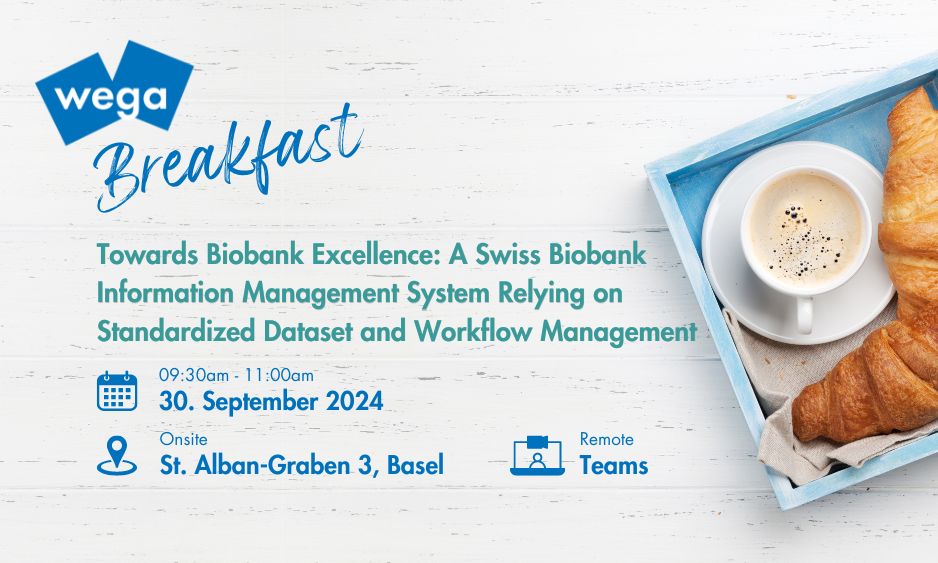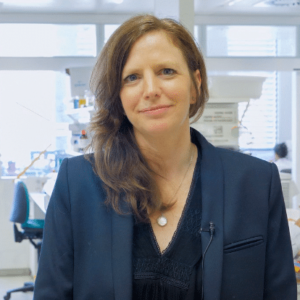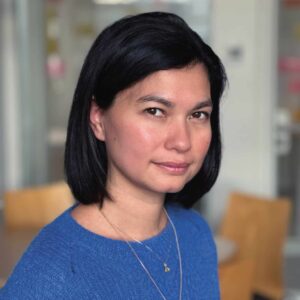wega Breakfast
Towards Biobank Excellence: A Swiss Biobank Information Management System Relying on Standardized Dataset and Workflow Management
We were delighted that you took part in our hybrid breakfast event!
Date:
September 30, 2024 from 08:30 to 10:00
Language:
English
Recording:

Agenda
08:30 - 08:45 a.m.
08:45 - 09:45 a.m.
09:45 - 10:00 a.m.
From 10:00 h
Intro
Presentation
Q&A and discussion
Coffee, croissants and networking
Abstract
Biobanks are cornerstones of medical research, with their success hinging on efficient sample processing and high-quality data collection. This presentation explores an innovative Biobank Information Management System (BIMS) specifically designed to address those objectives.
It delves into core functionalities of this BIMS. One key aspect being its ability to enforce standardized sample documentation based on predefined datasets. It ensures consistency and ability to sharing sample and data across biobanks. Furthermore, this BIMS offers configurable data collection, allowing to capture both mandatory and optional annotations. This flexibility guarantees comprehensive data collection while accommodating specificities of each biobank. Finally, the presentation explores how this system optimizes biobanking workflows by empowering biobanks to achieve operational excellence through streamlined process workflows while minimizing errors and maximizing efficiency.
Leveraging these functionalities allows Swiss biobanks to progress towards biobank excellence. This paves the way for further sample and data sharing through enhanced interoperability, fostering collaboration.
Our speakers

Christine Joye
Christine Joye is the Executive Director of Swiss Biobanking Platform. She graduated from Lausanne University in health sciences with a PhD in virology in 2004. In parallel, she obtained a master in health management, and entered the exciting field of biobanks in 2005. Her experience is mainly as a reference in the development of state of the art biobanks, first in oncology in 2007, then as a centralized institutional biobank in a hospital setting in 2013. In the Biobanking field, she implemented the first general consent for research purposes in Switzerland and was always very interested in biobank sustainability. In 2015, she took the position of the Executive Director of the national coordination platform in Switzerland for biobanking activities called Swiss Biobanking Platform, with the vision to promote access and usage of the existing and future banked bio-specimens for research purposes in the human as in the non-human fields.

Sabine Bavamian
Sabine Bavamian is a biologist by training. She gained her scientific background from more than 10 years in clinical and academic research. She graduated with a PhD in biology in the field of diabetes from the University of Geneva in Switzerland before being appointed as a Postdoctoral fellow at the Broad Institute of Harvard and the MIT in Cambridge (USA). There, she was involved in both clinical and academic research settings on projects related to psychiatric disorders. Back to Switzerland, she transitioned to clinical research by earning a master's degree in "Management of Clinical Trials". Since 2016, she joined Swiss Biobanking Platform, the reference research infrastructure for human and non-human biobanks funded by the Swiss National Science Foundation where she is now appointed as Chief Scientific Officer.

Khalil Roy
Khalil Roy is a designer and researcher from Lausanne, Switzerland. After getting his Master of Arts degree in interaction design in Geneva in 2013, he worked as a researcher in Human-Computer Interaction (HCI) at the university of Helsinki for six years. His research focused on the design, prototyping and evaluation of digital tools in support of information exploration. His work led to several peer-reviewed papers published in major HCI venues, which constituted the foundation of his doctoral thesis: "Explorable Information Spaces", presented in 2019 at the media department of the Aalto University in Espoo, Finland, where he graduated with distinction, and received that year's Dissertation Award. Today, Khalil is applying the visualization and interaction techniques he developed in his research to improve biobanking practices, through his involvement within Swiss Biobanking Platform (SBP).
